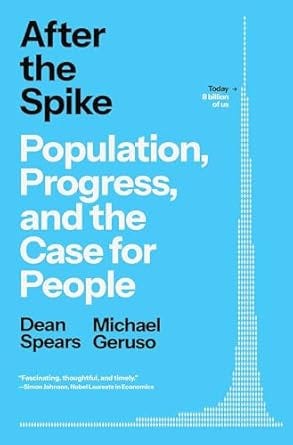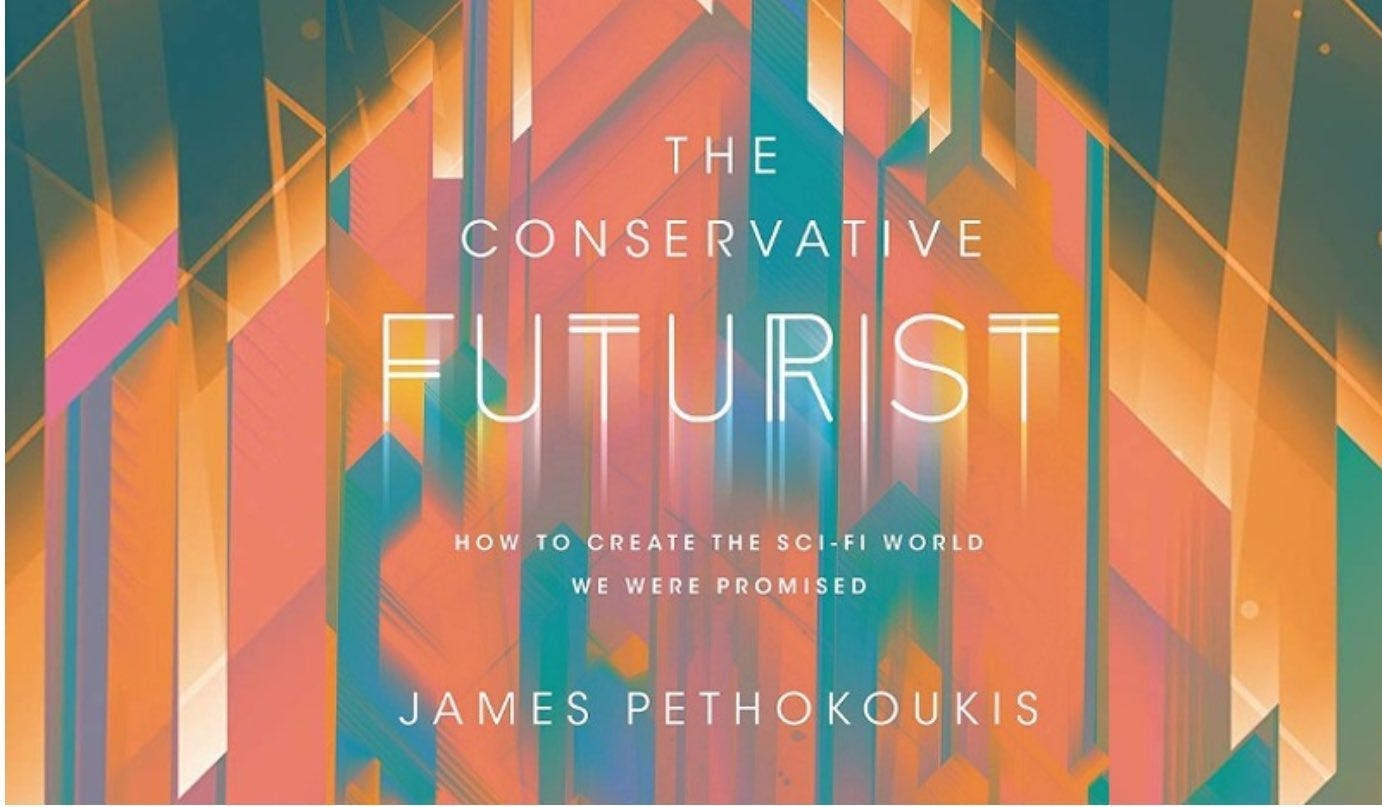My fellow pro-growth/progress/abundance Up Wingers,
Global population growth is slowing, and it’s not showing any signs of recovery. To the environmentalists of the 1970s, this may have seemed like a movement in the right direction. The drawbacks to population decline, however, are severe and numerous, and they’re not all obvious.
Today on Faster, Please! — The Podcast, I talk with economist and demographer Dean Spears about the depopulation trend that is transcending cultural barriers and ushering in a new global reality. We discuss the costs to the economy and human progress, and the inherent value of more people.
Spears is an associate professor of economics at Princeton University where he studies demography and development. He is also the founding executive director of r.i.c.e., a nonprofit research organization seeking to uplift children in rural northern India. He is a co-author with Michael Geruso of After the Spike: Population, Progress, and the Case for People.
In This Episode
Where we’re headed (1:32)
Pumping the breaks (5:41)
A pro-parenting culture (12:40)
A place for AI (19:13)
Preaching to the pro-natalist choir (23:40)
Quantity and quality of life (28:48)
Below is a lightly edited transcript of our conversation.
Where we’re headed (1:32)
. . . two thirds of people now live in a country where the birth rate is below the two children per two adults level that would stabilize the population.
Pethokoukis: Who are you and your co-author trying to persuade and what are you trying to persuade them of? Are you trying to persuade them that global depopulation is a real thing, that it's a problem? Are you trying to persuade them to have more kids? Are you trying to persuade them to support a certain set of pro-child or pro-natalist policies?
Spears: We are trying to persuade quite a lot of people of two important things: One is that global depopulation is the most likely future — and what global depopulation means is that every decade, every generation, the world's population will shrink. That's the path that we're on. We're on that path because birth rates are low and falling almost everywhere. It’s one thing we're trying to persuade people of, that fact, and we're trying to persuade people to engage with a question of whether global depopulation is a future to welcome or whether we should want something else to happen. Should we let depopulation happen by default or could it be better to stabilize the global population at some appropriate level instead?
We fundamentally think that this is a question that a much broader section of society, of policy discourse, of academia should be talking about. We shouldn't just be leaving this discussion to the population scientists, demographic experts, not only to the people who already are worried about, or talking about low birth rates, but this is important enough and unprecedented enough that everybody should be engaging in this question. Whatever your ongoing values or commitments, there's a place for you in this conversation.
Is it your impression that the general public is aware of this phenomenon? Or are they still stuck in the ’70s thinking that population is running amok and we’ll have 30 billion people on this planet like was the scenario in the famous film, Soylent Green? I feel like the people I know are sort of aware that this is happening. I don't know what your experience is.
I think it's changing fast. I think more and more people are aware that birth rates are falling. I don't think that people are broadly aware — because when you hear it in the news, you might hear that birth rates in the United States have fallen low or birth rates in South Korea have fallen low. I think what not everybody knows is that two thirds of people now live in a country where the birth rate is below the two children per two adults level that would stabilize the population.
I think people don't know that the world's birth rate has fallen from an average around five in 1950 to about 2.3 today, and that it's still falling and that people just haven't engaged with the thought that there's no special reason to expect it to stop and hold it to. But the same processes that have been bringing birth rates down will continue to bring them down, and people don't know that there's no real automatic stabilizer to expect it to come back up. Of the 26 countries that have had the lifetime birth rate fall below 1.9, none of them have had it go back up to two.
That's a lot of facts that are not as widely known as they should be, but then the implication of it, that if the world's birth rate goes below two and stays there, we're going to have depopulation generation after generation. I think for a lot of people, they're still in the mindset that depopulation is almost conceptually impossible, that either we're going to have population growth or something else like zero population growth like people might've talked about in the ’70s. But the idea that a growth rate of zero is just a number and then that it's not going to stop there, it's going to go negative, I think that's something that a lot of people just haven't thought about.
Pumping the breaks (5:41)
We wrote this book because we hope that there will be an alternative to depopulation society will choose, but there’s no reason to expect or believe that it's going happen automatically.
You said there's no automatic stabilizers — at first take, that sounds like we're going to zero. Is there a point where the global population does hit a stability point?
No, that's just the thing.
So we're going to zero?
Well, “there's no automatic stabilizer” isn't the same thing as “we're definitely going to zero.” It could be that society comes together and decides to support parenting, invest more in the next generation, invest more in parents and families, and do more to help people choose to be parents. We wrote this book because we hope that there will be an alternative to depopulation society will choose, but there’s no reason to expect or believe that it's going happen automatically. In no country where the birth rate has gone to two has it just magically stopped and held there forever.
I think a biologist might say that the desire to reproduce, that's an evolved drive, and even if right now we're choosing to have smaller families, that biological urge doesn't vanish. We've had population, fertility rates, rise and fall throughout history — don't you think that there is some sort of natural stabilizer?
We've had fluctuations throughout history, but those fluctuations have been around a pretty long and pretty widely-shared downward trend. Americans might be mostly only now hearing about falling birth rates because the US was sort of anomalous amongst richer countries and having a relatively flat period from the 1970s to around 2010 or so, whereas birth rates were falling in other countries, they weren't falling in the US in the same way, but they were falling in the US before then, they're falling in the US since then, and when you plot it over the long history with other countries, it's clear that, for the world as a whole, as long as we've had records, not just for decades, but for centuries, we've seen birth rates be falling. It's not just a new thing, it's a very long-term trend.
It's a very widely-shared trend because humans are unlike other animals in the important way that we make decisions. We have culture, we have rationality, we have irrationality, we have all of these. The reason the population grew is because we've learned how to keep ourselves and our children alive. We learned how to implement sanitation, implement antibiotics, implement vaccines, and so more of the children who were born survived even as the birth rate was falling all along. Other animals don't do that. Other animals don't invent sanitation systems and antibiotics and so I think that we can't just reason immediately from other animal populations to what's going to happen to humans.
I think one can make a plausible case that, even if you think that this is a problem — and again, it's a global problem, or a global phenomenon, advanced countries, less-advanced countries — that it is a phenomenon of such sweep that if you're going to say we need to stabilize or slow down, that it would take a set of policies of equal sweep to counter it. Do those actually exist?
No. Nobody has a turnkey solution. There's nothing shovel-ready here. In fact, it's too early to be talking about policy solutions or “here's my piece of legislation, here's what the government should do” because we’re just not there yet, both in terms of the democratic process of people understanding the situation and there even being a consensus that stabilization, at some level, would be better than depopulation, nor are we there yet on having any sort of answer that we can honestly recommend as being tested and known to be something that will reliably stabilize the population.
I think the place to start is by having conversations like this one where we get people to engage with the evidence, and engage with the question, and just sort of move beyond a reflexive welcoming of depopulation by default and start thinking about, well, what are the costs of people and what are the benefits of people? Would we be better off in a future that isn't depopulating over the long run?
The only concrete step I can think of us taking right now is adapting the social safety net to a new demographic reality. Beyond that, it seems like there might have to be a cultural shift of some kind, like a large-scale religious revival. Or maybe we all become so rich that we have more time on our hands and decide to have more kids. But do you think at some point someone will have a concrete solution to bring global fertility back up to 2.1 or 2.2?
Look at it like this: The UN projects that the peak will be about six decades from now in 2084. Of course, I don't have a crystal ball, I don't know that it's going to be 2084, but let's take that six-decades timeline seriously because we're not talking about something that's going to happen next year or even next decade.
But six decades ago, people were aware that — or at least leading scientists and even some policymakers were aware that climate change was a challenge. The original computations by Arrhenius of the radiative forcing were long before that. You have the Johnson speech to Congress, you have Nixon and the EPA. People were talking about climate change as a challenge six decades ago, but if somebody had gotten on their equivalent of a podcast and said, “What we need to do is immediately get rid of the internal combustion engine,” they would've been rightly laughed out of the room because that would've been the wrong policy solution at that time. That would've been jumping to the wrong solution. Instead, what we needed to do was what we've done, which is the science, the research, the social change that we're now at a place where emissions per person in the US have been falling for 20 years and we have technologies — wind, and solar, and batteries — that didn't exist before because there have been decades of working on it.
So similarly, over the next six decades, let's build the research, build the science, build the social movement, discover things we don't know, more social science, more awareness, and future people will know more than you and I do about what might be constructive responses to this challenge, but only if we start talking about it now. It's not a crisis to panic about and do the first thing that comes to mind. This is a call to be more thoughtful about the future.
A pro-parenting culture (12:40)
The world's becoming more similar in this important way that the difference across countries and difference across societies is getting smaller as birth rates converge downward.
But to be clear, you would like people to have more kids.
I would like for us to get on a path where more people who want to be parents have the sort of support, and environment, and communities they need to be able to choose that. I would like people to be thinking about all of this when they make their family decisions. I'd like the rest of us to be thinking about this when we pitch in and do more to help us. I don't think that anybody's necessarily making the wrong decision for themselves if they look around and think that parenting is not for them or having more children is not for them, but I think we might all be making a mistake if we're not doing more to support parents or to recognize the stake we have in the next generation.
But all those sorts of individual decisions that seem right for an individual or for a couple, combined, might turn into a societal decision.
Absolutely. I'm an economics professor. We call this “externalities,” where there are social benefits of something that are different from the private costs and benefits. If I decide that I want to drive and I contribute to traffic congestion, then that's an externality. At least in principle, we understand what to do about that: You share the cost, you share the benefits, you help the people internalize the social decision.
It's tied up in the fact that we have a society where some people we think of as doing care work and some people we think of as doing important work. So we've loaded all of these costs of making the next generation on people during the years of their parenting and especially on women and mothers. It's understandable that, from a strictly economic point of view, somebody looks at that and thinks, “The private costs are greater than the private benefits. I'm not going to do that.” It's not my position to tell somebody that they're wrong about that. What you do in a situation like that is share and lighten that burden. If there's a social reason to solve traffic congestion, then you solve it with public policy over the long run. If the social benefits of there being a flourishing next generation are greater than people are finding in their own decision making, then we need to find the ways to invest in families, invest in parenting, lift and share those burdens so that people feel like they can choose to be parents.
I would think there’s a cultural component here. I am reminded of a book by Jonathan Last about this very issue in which he talks about Old Town Alexandria here in Virginia, how, if you go to Old Town, you can find lots of stores selling stuff for dogs, but if you want to buy a baby carriage, you can't find anything.
Of course, that's an equilibrium outcome, but go on.
If we see a young couple pushing a stroller down the street and inside they have a Chihuahua — as society, or you personally, would you see that and “Think that's wrong. That seems like a young couple living in a nice area, probably have plenty of dough, they can afford daycare, and yet they're still not going to have a kid and they're pushing a dog around a stroller?” Should we view that as something's gone wrong with our society?
My own research is about India. My book's co-authored with Mike Geruso. He studies the United States more. I'm more of an expert on India.
Paul Ehrlich, of course, begins his book, The Population Bomb, in India.
Yes, I know. He starts with this feeling of being too crowded with too many people. I say in the book that I almost wonder if I know the exact spot where he has that experience. I think it's where one of my favorite shops are for buying scales and measuring tape for measuring the health of children in Uttar Pradesh. But I digress about Paul Ehrlich.
India now, where Paul Ehrlich was worried about overpopulation, is now a society with an average birth rate below two kids per two adults. Even Uttar Pradesh, the big, disadvantaged, poor state where I do my work in research, the average young woman there says that they want an average of 1.9 children. This is a place where society and culture is pretty different from the United States. In the US, we're very accustomed to this story of work and family conflict, and career conflicts, especially for women, and that's probably very important in a lot of people's lives. But that's not what's going on in India where female labor force participation is pretty low. Or you hear questions about whether this is about the decline of religiosity, but India is a place where religion is still very important to a lot of people's lives. Marriage is almost universal. Marriage happens early. People start their childbearing careers in their early twenties, and you still see people having an average below two kids. They start childbearing young and they end childbearing young.
Similarly, in Latin America, where religiosity, at least as reported in surveys, remains pretty high, but Latin America is at an average of 1.8, and it's not because people are delaying fertility until they're too old to get pregnant. You see a lot of people having permanent contraception surgery, tubal obligations.
And so this cultural story where people aren't getting married, they're starting too late, they're putting careers first, it doesn't match the worldwide diversity. These diverse societies we're seeing are all converging towards low birth rates. The world's becoming more similar in this important way that the difference across countries and difference across societies is getting smaller as birth rates converge downward. So I don't think we can easily point towards any one cultural for this long-term and widely shared trend.
A place for AI (19:13)
If AI in the future is a compliment to what humans produce . . . if AI is making us more productive, then it's all the bigger loss to have fewer people.
At least from an economic perspective, I think you can make the case: fewer people, less strain on resources, you’re worried about workers, AI-powered robots are going to be doing a lot of work, and if you're worried about fewer scientists, the scientists we do have are going to have AI-powered research assistants.
Which makes the scientists more important. Many technologies over history have been compliments to what humans do, not substitutes. If AI in the future is a compliment to what humans produce — scientific research or just the learning by doing that people do whenever they're engaging in an enterprise or trying to create something — if AI is making us more productive, then it's all the bigger loss to have fewer people.
To me, the best of both worlds would be to have even more scientists plus AI. But isn’t the fear of too few people causing a labor shortage sort of offset by AI and robotics? Maybe we’ll have plenty of technology and capital to supply the workers we do have. If that’s not the worry, maybe the worry is that the human experience is simply worse when there are fewer children around.
You used the term “plenty of,” and I think that sort of assumes that there's a “good enough,” and I want to push back on that because I think what matters is to continue to make progress towards higher living standards, towards poverty alleviation, towards longer, better, healthier, safer, richer lives. What matters is whether we're making as much progress as we could towards an abundant, rich, safe, healthy future. I think we shouldn't let ourselves sloppily accept a concept of “good enough.” If we're not making the sort of progress that we could towards better lives, then that's a loss, and that matters for people all around the world.
We're better off for living in a world with other people. Other people are win-win: Their lives are good for them and their lives are good for you. Part of that, as you say, is people on the supply side of the economy, people having the ideas and the realizations that then can get shared over and over again. The fact that ideas are this non-depletable resource that don't get used up but might never be discovered if there aren't people to discover them. That's one reason people are important on the supply side of the economy, but other people are also good for you on the demand side of the economy.
This is very surprising because people think that other people are eating your slice of the pie, and if there are more other people, there's less for me. But you have to ask yourself, why does the pie exist in the first place? Why is it worth some baker's while to bake a pie that I could get a slice of? And that's because there were enough people wanting slices of pie to make it worth paying the fixed costs of having a bakery and baking a whole pie.
In other words, you're made better off when other people want and need the same things that you want and need because that makes it more likely for it to exist. If you have some sort of specialized medical need and need specialized care, you're going to be more likely to find it in a city where there are more other people than in a less-populated rural place, and you're going to be more likely to find it in a course of history where there have been more other people who have had the same medical need that you do so that it's been worthwhile for some sort of cure to exist. The goodness of other people for you isn't just when they're creating things, it's also when they're just needing the same things that you do.
And, of course, if you think that getting to live a good life is a good thing, that there's something valuable about being around to have good experiences, that a world of more people having good experiences has more goodness in it than a world of fewer people having good experiences in it. That's one thing that counts, and it's one important consideration for why a stabilized future might be better than a depopulating future. Now, I don't expect everyone to immediately agree with that, but I do think that the likelihood of depopulation should prompt us to ask that question.
Preaching to the pro-natalist choir (23:40)
If you are already persuaded listening to this, then go strike up a conversation with somebody.
Now, listening to what you just said, which I thought was fantastic, you're a great explainer, that is wonderful stuff — but I couldn't help but think, as you explained that, that you end up spending a lot of time with people who, because they read the New York Times, they may understand that the ’70s population fears aren't going to happen, that we're not going to have a population of 30 billion that we're going to hit, I don't know, 10 billion in the 2060s and then go down. And they think, “Well, that's great.”
You have to spend a lot of time explaining to them about the potential downsides and why people are good, when like half the population in this country already gets it: “You say ‘depopulation,’ you had us at the word, ‘depopulation.’” You have all these people who are on the right who already think that — a lot of people I know, they're there.
Is your book an effective tool to build on that foundation who already think it's an issue, are open to policy ideas, does your book build on that or offer anything to those people?
I think that, even if this is something that people have thought about before, a lot of how people have thought about it is in terms of pension plans, the government's budget, the age structure, the nearer-term balance of workers to retirees.
There's plenty of people on the right who maybe they're aware of those things, but also think that it really is kind of a The Children of Men argument. They just think a world with more children is better. A world where the playgrounds are alive is better — and yes, that also may help us with social security, but there's a lot of people for whom you don't have to even make that economic argument. That seems to me that that would be a powerful team of evangelists — and I mean it in a nonreligious way — evangelists for your idea that population is declining and there are going to be some serious side effects.
If you are already persuaded listening to this, then go strike up a conversation with somebody. That's what we want to have happen. I think minds are going to be changed in small batches on this one. So if you're somebody who already thinks this way, then I encourage you to go out there and start a conversation. I think not everybody, even people who think about population for a living — for example, one of the things that we engage with in the book is the philosophy of population ethics, or population in social welfare as economists might talk about it.
There have been big debates there over should we care about average wellbeing? Should we care about total wellbeing? Part of what we're trying to say in the book is, one, we think that some of those debates have been misplaced or are asking what we don't think are the right questions, but also to draw people to what we can learn from thinking of where questions like this agree. Because this whole question of should we make the future better in total or make the better on average is sort of presuming this Ehrlich-style mindset that if the future is more populous, then it must be worse for each. But once you see that a future that's more populous is also more prosperous, it'd be better in total and better on average, then a lot of these debates might still have academic interest, but both ways of thinking about what would be a better future agree.
So there are these pockets of people out there who have thought about this before, and part of what we're trying to do is bring them together in a unified conversation where we're talking about the climate modeling, we're talking about the economics, we're talking about the philosophy, we're talking about the importance of gender equity and reproductive freedom, and showing that you can think and care about all of these things and still think that a stabilized future might be better than depopulation.
In the think tank world, the dream is to have an idea and then some presidential candidate adopts the idea and pushes it forward. There’s a decent chance that the 2028 Republican nominee is already really worried about this issue, maybe someone like JD Vance. Wouldn’t that be helpful for you?
I've never spoken with JD Vance, but from my point of view, I would also be excited for India's population to stabilize and not depopulate. I don't see this as an “America First” issue because it isn't an America First issue. It's a worldwide, broadly-shared phenomenon. I think that no one country is going to be able to solve this all on its own because, if nothing else, people move, people immigrate, societies influence one another. I think it's really a broadly-shared issue.
Quantity and quality of life (28:48)
What I do feel confident about is that some stabilized size would be better than depopulation generation after generation, after generation, after generation, without any sort of leveling out, and I think that's the plan that we're on by default.
Can you imagine an earth of 10 to 12 billion people at a sustained level being a great place to live, where everybody is doing far better than they are today, the poorest countries are doing better — can you imagine that scenario? Can you also imagine a scenario where we have a world of three to four billion, which is a way nicer place to live for everybody than it is today? Can both those scenarios happen?
I don't see any reason to think that either of those couldn't be an equilibrium, depending on all the various policy choices and all the various . . .
This is a very broad question.
Exactly. I think it's way beyond the social science, economics, climate science we have right now to say “three billion is the optimal size, 10 billion is the optimal size, eight billion is the optimal size.” What I do feel confident about is that some stabilized size would be better than depopulation generation after generation, after generation, after generation, without any sort of leveling out, and I think that's the plan that we're on by default. That doesn't mean it's what's going to happen, I hope it's not what happens, and that's sort of the point of the conversation here to get more people to consider that.
But let's say we were able to stabilize the population at 11 billion. That would be fine.
It could be depending on what the people do.
But I’m talking about a world of 11 billion, and I'm talking about a world where the average person in India is as wealthy as, let's say this is in the year 2080, 2090, and at minimum, the average person in India is as wealthy as the average American is today. So that's a big huge jump in wealth and, of course, environmentalism.
And we make responsible environmental choices, whether that's wind, or solar, or nuclear, or whatever, I'm not going to be prescriptive on that, but I don't see any reason why not. My hope is that future people will know more about that question than I do. Ehrlich would've said that our present world of eight billion would be impossible, that we would've starved long before this, that England would've ceased to exist, I think is a prediction in his book somewhere.
And there's more food per person on every continent. Even in the couple decades that I've been going to India, children are taller than they used to be, on average. You can measure it, and maybe I'm fooling myself, but I feel like I can see it. Even as the world's been growing more populous, people have been getting better off, poverty has been going down, the absolute number of people in extreme poverty has been going down, even as the world's been getting more populous. As I say, emissions per person have been going down in a lot of places.
I don't see any in principle, reason, if people make the right decisions, that we couldn't have a sustainable, healthy, and good, large sustained population. I've got two kids and they didn't add to the hole in the ozone layer, which I would've heard about in school as a big problem in the ’80s. They didn't add to acid rain. Why not? Because the hole in the ozone layer was confronted with the Montreal Protocol. The acid rain was confronted with the Clean Air Act. They don't drive around in cars with leaded gasoline because in the ’70s, the gasoline was unleaded. Adding more people doesn't have to make things worse. It depends on what happens. Again, I hope future people will know more about this than I do, but I don't see any, in principle reason why we couldn't stabilize at a size larger than today and have it be a healthy, and sustainable, and flourishing society.
On sale everywhere The Conservative Futurist: How To Create the Sci-Fi World We Were Promised
Micro Reads
▶ Economics
The Macro Impact of AI on GDP - The Overshoot
▶ Business
Alexandr Wang is now leading Meta’s AI dream team. Will Mark Zuckerberg's big bet pay off? - Fortune
Amazon is betting on agents to win the AI race - The Verge
Intuit Earnings Beat Estimates as Company Focuses on Artificial Intelligence Growth Drivers - Barron's
Wall Street Is Too Complex to Be Left to Humans - Bberg Opinion
▶ Policy/Politics
▶ AI/Digital
AI Unveils a Major Discovery in Ancient Microbes That Could Hold the Key to Next Generation Antibiotics - The Debrief
A.I. May Be Just Kind of Ordinary - NYT Opinion
The AI Doomers Are Getting Doomier - The Atlantic
State of AI in Business 2025 - MIT NANDA
What Workers Really Want from Artificial Intelligence - Stanford HAI
▶ Biotech/Health
How to Vaccinate the World - Asterisk
Securing America’s Pharmaceutical Innovation Edge - JAMA Forum
▶ Clean Energy/Climate
How Electricity Got So Expensive - Heatmap
How Bill McKibben Lost the Plot - The New Atlantis
▶ Robotics/Drones/AVs
▶ Space/Transportation
▶ Up Wing/Down Wing
Reality is evil - Aeon
The Case for Crazy Philanthropy - Palladium
▶ Substacks/Newsletters
No, ‘the Economists’ Didn’t Botch Trump’s Tariffs - The Dispatch
How Does the US Use Water? - Construction Physics
A Climate-Related Financial Risk Boondoggle - The Ecomodernist
What's up with the States? - Hyperdimensional
▶ Social Media
On why AI won't take all the jobs - @Dan_Jeffries1
On four nuclear reactors to be built in Amarillo, TX - @NuclearHazelnut
On AI welfare and consciousness - @sebkrier













